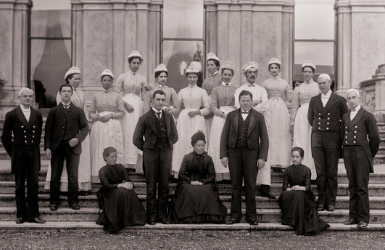Shortage of Women Servants
04 March 1921

The Times, 4 March 1921
The First World War brought new and unprecedented employment opportunities for women. Before the war the vast majority of women who worked were employed in domestic service, but the calling up of thousands of men to fight in 1914 meant that women were called on in large numbers to work in factories and heavy industry for the first time. These trends continued after the war: this article from The Times complained about the shortage of female domestic servants and the training needed for young girls seeking to enter service.
Why Servants are Scarce: War Girls in Need of Service
The question or possibility of drafting unemployed women into domestic service, raised in The Times of yesterday, was discussed by Miss Lilian Barker, executive officer of the Central Committee which deals with training of women who have suffered loss of health and opportunity arising out of the war.
Miss Barker said: ‘The principal reason of the great shortage in domestic service is that there was no new blood drafted into that service during the war. From 1914 to the end of war girls of 15 and 16 went into munitions work, where they were wanted, and the women who are now mistresses calling them went into Red Cross work. These girls who in normal times would be trained cooks, housemaids or parlourmaids of 21 or 22 are without any training in housework and housecraft, which is an extra-ordinary skilled profession, if one expects efficient service in its different branches.
These girls come from humble homes. They know nothing about housework. Usually only one girl in a big working class family can be spared to help the tired mother; the others have to go out and earn; and being without training the majority of them would hardly be suitable to act as cooks, parlourmaids or nurserymaids.
Many of the original servants of 1914 have married. They make excellent wives, and had more opportunities during the war than they would have had in normal times, and they are now some of them widows with little children, who can only go out as daily workers. ...
Trainees in Demand
Mistresses say they will train the girls if they will come to them. But they are thinking of adaptable little girls of 15 or 16, and they are not anxious to train grown women. … They are not being offered to girls who for these years of war have lived in hostel dormitories and eaten canteen food, all of which was prepared for them, as it was for the men who were doing the similar work.
If women who have no home ties and could take up domestic work, were given a short training to take the edges off their ignorance to accustom them to the utensils which are not found in the homes of the poor, they could be in considerable numbers absorbed into domestic work.














